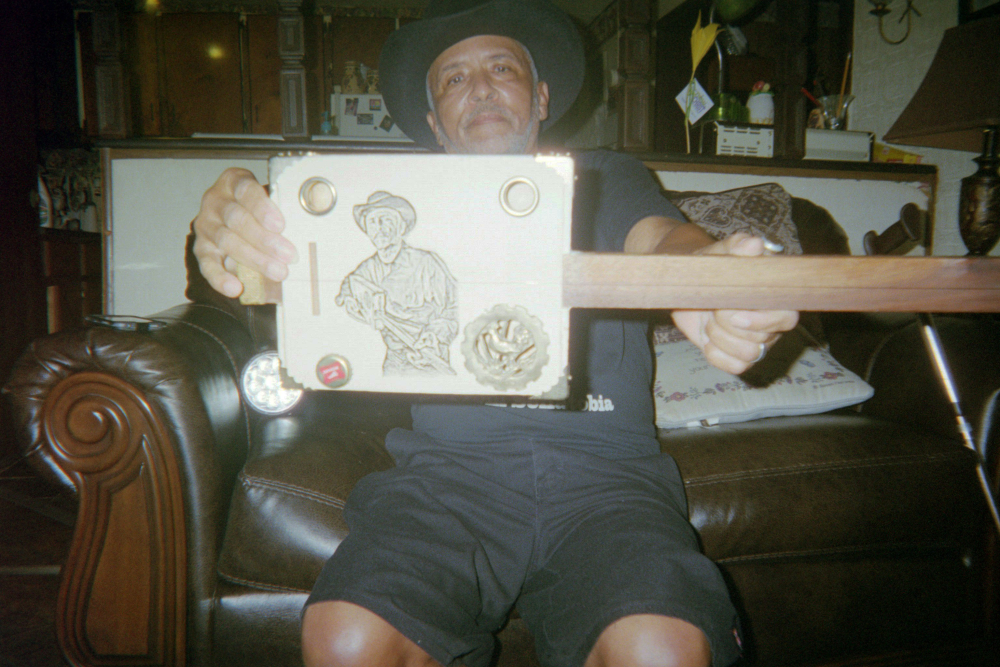I had heard of such an instrument and my parents even mentioned how they would improvise a kind of one-string (a simple wire attached to the side of a house or a pole) and try to play music. This didn’t prepare me for the seemingly impossible bit of magic that was conjured on that day.
I first witnessed Glen Faulkner play his one-string on a cold winter evening in 2012. I say witnessed, because I didn’t actually see Faulkner play. I had been living in New Orleans at the time, and decided to make a trip to Panola County for what was being billed as a repatriation ceremony for the materials collected by Alan Lomax on his trips to the area. The trip didn’t make much sense. I had just returned to New Orleans after spending several weeks in Memphis for the holiday. I only had a day’s notice, but I was following what I call a thread. Sometimes an event or book or image will call to me. After I heard about the event from several different sources, I felt that I needed to be there. So, I followed the thread. I was not the only person who heeded the call. The library was so crowded that some stood outside to hear the presentations. I lost my place in the main room because I stepped into the hallway for a moment to speak to one of the dozen or so relatives who had also showed up for the event.
Though I did not have a good view of Mr. Faulkner as he played, the sounds that he produced from the instrument, even without amplification, filled the room with a sonorous complexity that seemed almost in defiance of being made with a single string. I had heard of such an instrument and my parents even mentioned how they would improvise a kind of one-string (a simple wire attached to the side of a house or a pole) and try to play music. This didn’t prepare me for the seemingly impossible bit of magic that was conjured on that day.
As I drove back to Memphis with my family, my father asked, “Did you get what you need? Was it worth it?” Even though I couldn’t exactly explain it then, I knew that it was.
In the summer of 2016 I accompanied my uncle, Julius Harris, retired social studies teacher and current blues enthusiast and activist for a visit with the self-named ‘King of the One-String” at his home in Gravel Springs, Mississippi. We arrived at a tidy brick home awash with myrtle trees in bloom in the yard and a family of cats sunning themselves on the porch. We were warmly greeted by Mr. Glen Faulkner and treated to a concert that spanned the American tradition of song-making. Faulkner played over two dozen songs--from gospel, to country, to the blues and back.
I was 23 years old before I was making notes that anybody else would know.
Mr. Faulkner is one of the few musicians who plays the one-string guitar (also called a diddley-bow) exclusively. Faulkner says that his cousin Napolian Strickland, known for his drum and fife playing, also played a bit of the diddley-bow. He learned watching an uncle who had a diddley-bow fashioned to the side of his grandmother’s house that he was forbidden to play. Of course, at every opportunity he could, he would try his hand at the instrument. “I was 23 years old before I was making notes that anybody else would know.” His dedication to this one instrument shows. Faulkner said that he tried the guitar for a bit, but never made any headway with it. The one-string is a kind of spiritual instrument for him, where the player is divinely connected.
“I got to thinking, what if somebody else wants to hear me? I can’t take the house with me!”
Faulkner eventually fashioned a one-string to his own house.
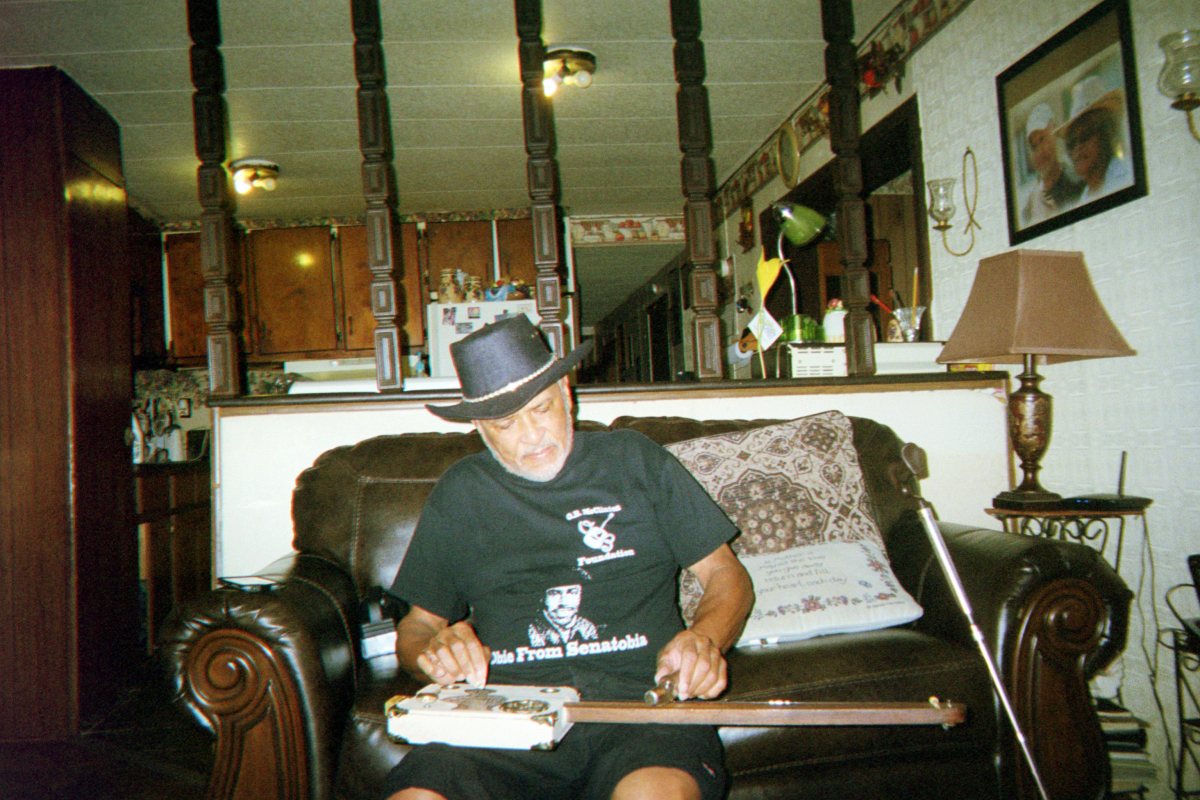
It was then he took a doorstep from his house to work and a friend fashioned a diddley-bow from it, stained it and put his name on it. This was the instrument he took to one of his first shows at The University of Memphis (then Memphis State).
Even though there are few players of his skill in the world, Faulkner is equipped with enough instruments for a band. He showed me six from his collection. All of them were gifts except the original one that he crafted from his doorstep. “I got an extra one, so if somebody come and they want, they can play!” The instruments themselves are works of art, made from materials as varied as a pool stick, a cigar box from Honduras, and a metal curio box painted with intricate flowers.
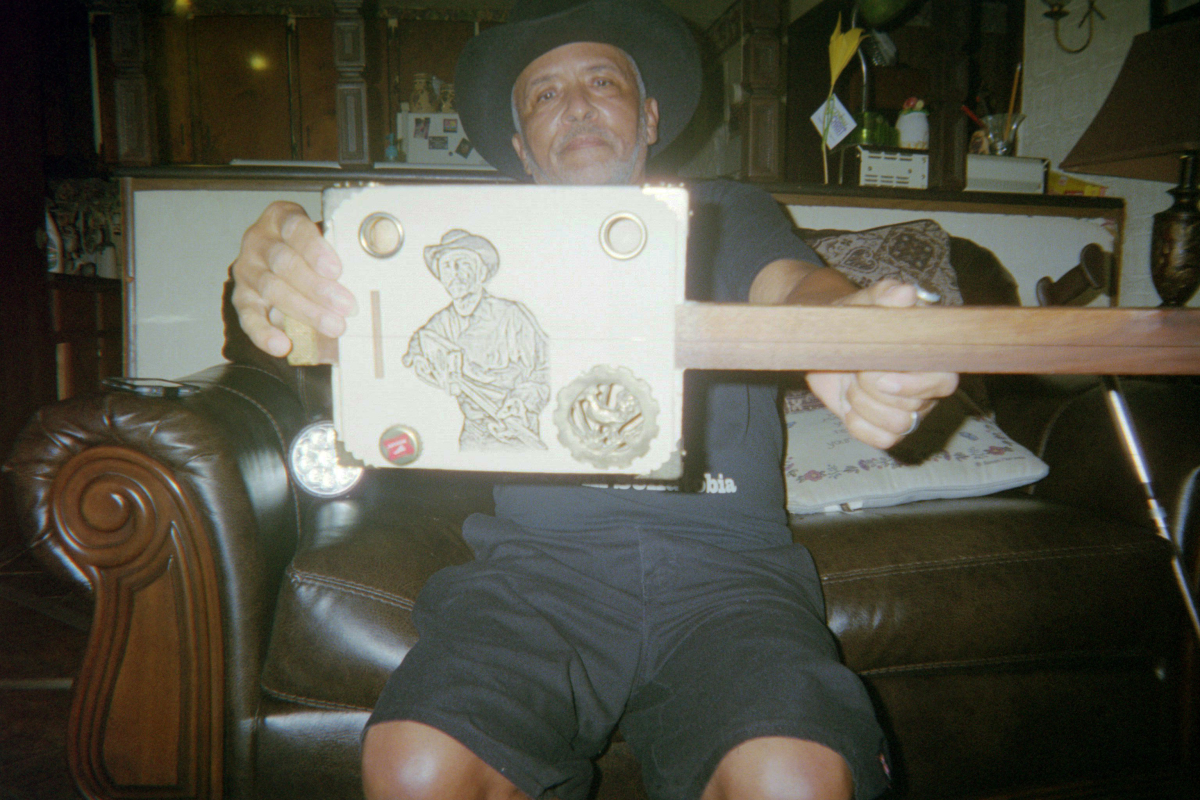
The instruments themselves are works of art, made from materials as varied as a pool stick, a cigar box from Honduras, and a metal curio box painted with intricate flowers.
His one-strings have taken him to various festivals as well as a trip to Dresden, Germany, where he represented the state of Mississippi. It was on this overseas trip that a signature to his playing developed from necessity. He would normally use his pocketknife as a slide, but couldn’t take the weapon on the plane with him due to travel regulations. It was then he started using one of his wife’s perfume bottles as a slide. I did a little investigating with Mrs. Faulkner to discover that his famous perfume bottle slide is a Lady Stetson bottle. Back when snuff was sold in bottles, they were often used as a slide for the diddley-bow.
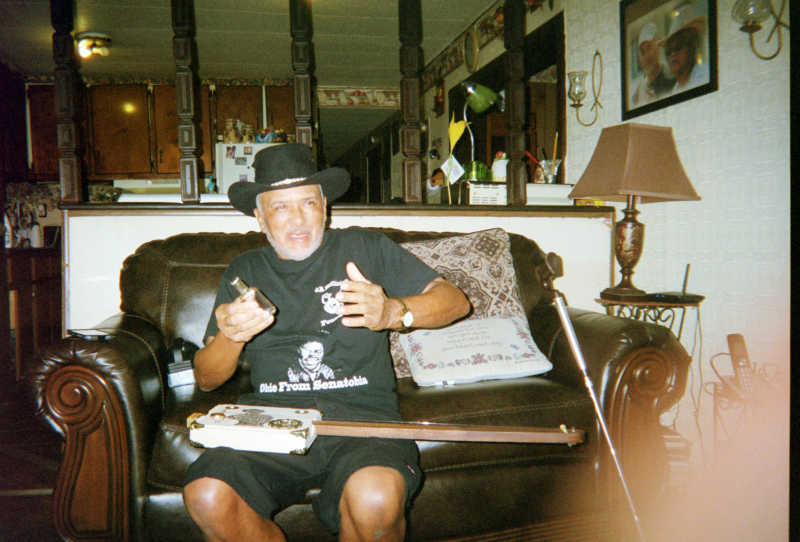
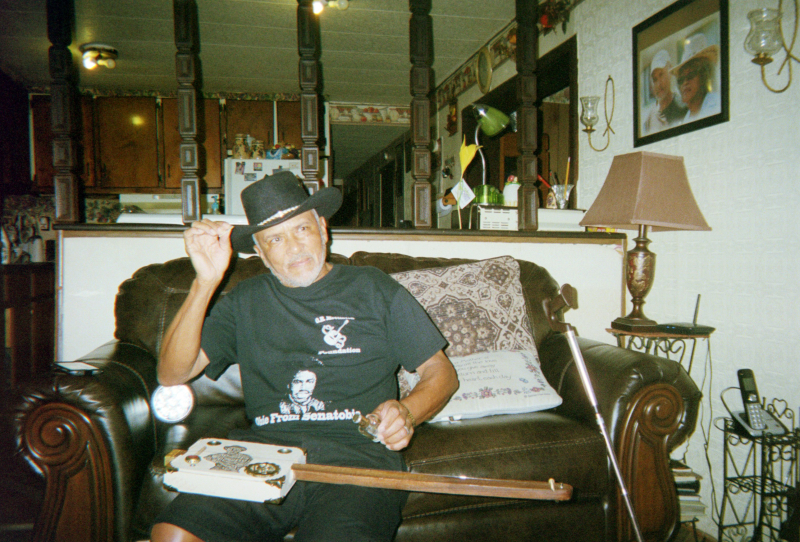
“I never thought that I could play the National Anthem with my eyes closed.”
The process of playing the one-string seems to become more and more mystifying the more I watch it. “It’s just a God-given gift,” Faulkner says. “I never thought that I could play the National Anthem with my eyes closed.” And then Faulkner does just that, playing not only the “Battle Hymn of the Republic” and “The Star-Spangled Banner.” Faulkner says that everything he can play, he can play with his eyes closed, “I’m not bragging!” he says with a grin. And he isn’t. This seems even more incredible because Faulkner learns the songs by ear. Faulkner had heard Mississippi Fred McDowell in person a few times as a child growing up in Mississippi.
“Yeah, I know this sounds like I’m not telling the truth, but one night I was sitting up here by myself and that song, ‘Get Right Church’ came on. I never played it, honest to truth, I went down that wire one time and didn’t miss a lick and I’ve been playing it ever since.”
Fans of the blues in general and the one-string in particular seek him out from all over the world. One of the students who came to study with him gifted him a two-string, but when Faulkner plays it, he only plays the bottom string. “I don’t wanna jump off and try to play two, gonna stick to what I started off with.”
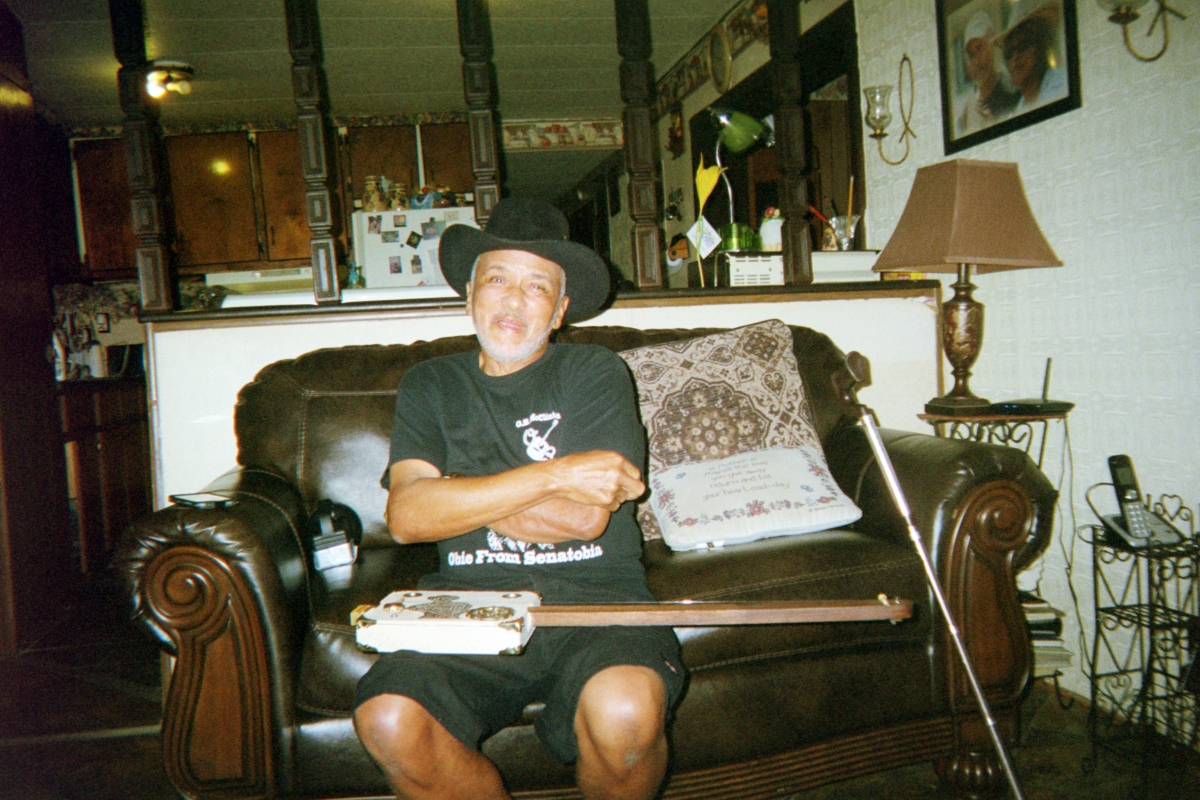
Although students have come to record him, there are only a few one-string players in the States. Faulkner’s son was killed by a drunk driver in 1997. He had hoped to recruit him into the tradition. “I tried to get my son to play…he said, ‘Daddy, I can’t play no one-string.’ Well, maybe he could, because if you ask me, Glen, how do you play that, I couldn’t tell you. Ain’t no way in the world I could tell you how I play this thing.” It is clear how much joy playing the one-string gives Faulkner and those who hear him. After his son was killed, Faulkner didn’t pick up his instrument for around a year. When he was ready to play again, the songs were right where he left them. “Once you learn to play something on the one-string, you never forget it.” And if you are lucky enough to hear “The King of the One-String” play, you will never forget it either.
Resources
Links
Read more about the stories of bluesmen and women and experience the blues where they were born at The Mississippi Blues Trail

